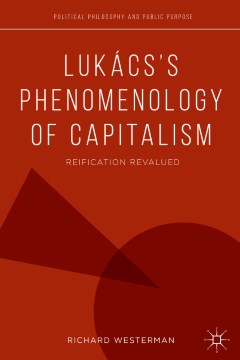Book | Chapter
The history of history and class consciousness
pp. 83-111
Abstract
Tracing the development of Lukács's thought from the heady days of revolution in 1919 to the publication of History and Class Consciousness in 1923, Westerman argues Lukács's masterwork should not be seen as a single, relatively unified whole. The last-written essays of the book—"What is Orthodox Marxism?,' "Reification and the Consciousness of the Proletariat,' and "Towards a Methodology of the Problem of Organisation'—are quite different from the earlier ones in their theoretical sophistication. Pointing to the references Lukács makes, to changes in his use of the term "consciousness,' and to Lukács's increasing tendency to use the term "totality' to designate a self-enclosed whole, Westerman argues that these essays represent a theoretical return to his Heidelberg works. This justifies treating those works as a unified lens to interpret Lukács's Marxian social theory.
Publication details
Published in:
Westerman Richard (2019) Lukács's phenomenology of capitalism: reification revalued. New York, Palgrave Macmillan.
Pages: 83-111
DOI: 10.1007/978-3-319-93287-3_3
Full citation:
Westerman Richard (2019) The history of history and class consciousness, In: Lukács's phenomenology of capitalism, New York, Palgrave Macmillan, 83–111.



